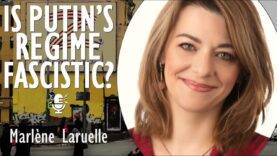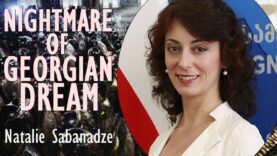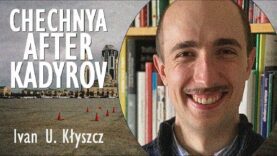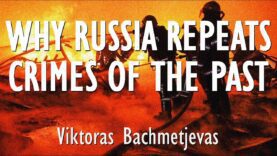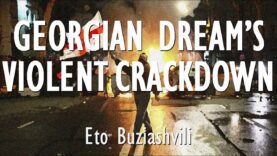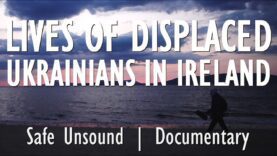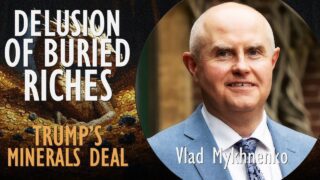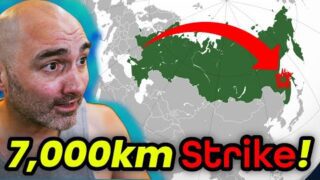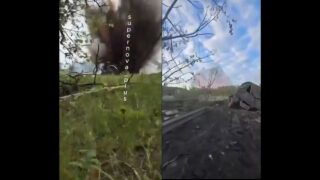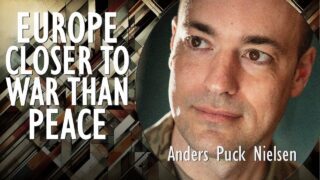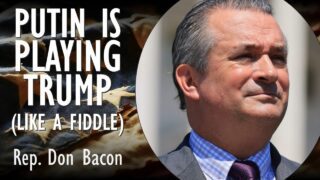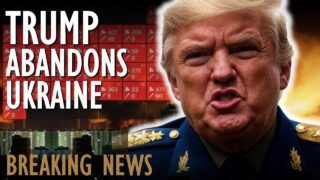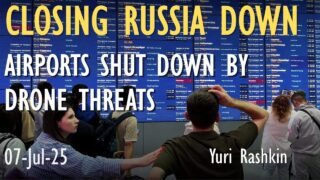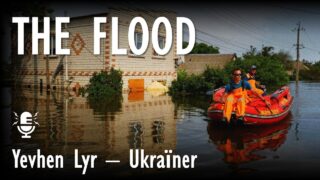Safe Unsound – Exploring a Film Following the Lives & Challenges of Displaced…
Safe Unsound – Exploring a Film Following the Lives & Challenges of Displaced Ukrainians in Ireland.
Summarize the following text after “GO” to 400 words but do not output anything saying it is a summary or the number of words. do not mention the video creator or author or the word video, just write the summary like it is an short article in first person. GO three Ukrainian families find a foothold in a remote corner of Ireland how temporary is their life there no one knows today I’m talking to the makers of a groundbreaking film about the lives and challenges of displaced ukrainians who found themselves in Ireland welcome to Silicon curtain please like subscribe and definitely comment especially on this one do share it with friends acquaintances as well so they can get better informed about what happening in Ukraine and why it’s so important to support Ukraine and ukrainians and of course many people watching this will have had Direct experience with ukrainians in their communities I hope that this video and the film that it’s about will help people gain a better understanding of the challenges of displaced ukrainians who’ve been forced out of their home cities by the Russian invasion and today I’m going to be talking to three people involved in the creation of this fantastic film Daniel James Baldwin is the director and producer Steven Lacy the executive producer and Daria corac editor and translator we should also mention two other people who are not present today on the video but who have played an instrumental role in the creation of this film that is Hannah tuie the producer and Jackie tabul the Director of Photography welcome to Silicon curtain nice to be here nice to be here well let’s let’s jump straight in here uh because people want to know what what’s the film what’s it about why did you make it what stage is it at so what is the film and what are you trying to achieve with the film this is a question I’m going to everyone’s going to have you know a chance of answering and then subsequent questions as we work through I think will direct to individual people to avoid repetition but I think you you know you might all have a slightly different take on why this Project’s important um let’s start with uh with uh Daria um I think the main purpose of this project is to kind of change the perception of uh ukrainians and local communities because uh even though the Practical perception has been great uh there is still some there are still some stereotypes that make people hide behind the label of refugees or displaced people and uh to me because I’m leaving this experience as well it’s important to break the stereotype and just show the lives of of people as they are Daniel you’re very very closely involved in the creative aspects of this film uh what What’s your vision for what’s going to end up on the screen well I mean there’s a story in that I mean it was something at the beginning and it’s evolved into something else um but I guess if you are you know right now if I’m to to explain what I hope to achieve with it we’ve got three families um who feature heavily in the film it’s about their lived experience in County Mayo which is a rural community in Ireland um it’s a really fascinating area which we’ll go into later in terms of the the local history you know and you know what the impact of the um the influx of refugees from Ukraine or displaced people rather from Ukraine has uh has had there in other places like it but I mean essentially it’s I want it to be a poetic film I want it to be a film that um has has has posos for the people who we filmed with who trusted us with their stories for 14 months and as Daria says I think that um ultimately the film’s purpose is to be able to speak to host communities and um encourage them to you know see these people who are new neighbors of theirs um as people rather than social media specters or news headlines and we should turn to Stephen now and get his point of view on that before we you know get into the next topic uh Stephen why why are you involved in this and why is there such a passion project for you so it’s it’s a really good question so so I care deeply about Ukraine so I first went to Ukraine in 2006 and used to go to Mar opal for my kind of summer holidays and it’s a city that I care about a city that I love passionately a city where I’ve got lots of friends I’ve got lots of friends across the East and when this brutal br brutal escalation occurred of complete and utter Devastation I made a promise to my friends and also to St Nicholas on the day of the bombing in in February that I do everything in my power to help Ukraine and not just for the shortcoming and for the victory but also for the rest of my life so I’ve been supporting a lot of kind of Ukrainian kind of initiatives such as kind of Ukraine Institute I speak a lot at the rallies and speak about the evil and brutality of K Russian propaganda I’ve gone back and done a master’s School of syonic studies on Ukrainian history and kind of on politics and really looking at kind of Russian kind of propaganda so when this happened there was a lot of narratives quite rightly that were about the meta kind of narratives the geopolitical but I really wanted to kind of make a film that was about the human stories and bottom up to tell the big kind of meta kind of stor so I had this idea that I really want to kind of film and understand this place ukrainians in a completely different area to where it’s usually filmed IE kind of kind of big cities and so I approached kind of Daniel with the kind of Genesis of the idea I think the the other big area is that I’m really passionate about kind of Outsiders I run a research company and a cultural inside company called The Outsiders I’m disabled myself so I’ve kind of got a lobster hand and and and bow kind of leg so the whole idea of outside and then coming inside was really really important to me but also just countering the brutality the manipulation and the complete darkness of Russian propaganda with always feeds on Outsiders and that’s a fascinating point isn’t it because propaganda is an area I’ve become fascinated in I have to declare an interest here Steve and I met um soon after fullscale Invasion because we’re attending the same kind of events and you know eventually you you you spot who are the repeat offenders going to all the different events um but Russian narratives or any propaganda narratives for that matter or even political spin it negates the voice of IND indviduals it seems you know it seeks to paper over whatever differences and nuances there might be and it drowns out their voices and unfortunately it is incredibly successful um that leads me to the next question really which is on the impact of the film because you’re creating a very very personal uh sort of product here um it doesn’t deal in the big issues of geopolitics or what it touches upon them of course because we’re going to talk about uh some of the resistance some of the sort of especially right Wing resistance to displaced people and existing social issues which are exacerbated and leverage well we’ll park that for a minute we’ll come back to that because I think this is an important aspect of the film as well but the impact is important because you’re telling a story about individuals and what you want is for other individuals for that to resonate with them and I’m assuming for them to take action as well so what is the desired impact What In Your Wildest Dreams will the film achieve in terms of sort of shaping and changing people’s behaviors these sorts of views in in the in the current landscape people are entrenched a little bit more than they used to be with these sorts of views so we’re talking about you know influence from a you know and we’ve got to be very you know honest about how difficult it is to influence anybody now um but I think the the purpose of concentrating on the stories and in the way that we’re the way that we are is that we felt like when we were there and we were there the the original um trip which was a week long back in May 2022 was to potentially make a short film based on filming there with a couple of families for that period of time five days six days whatever it was that we spent there then while we were there myself and Jackie um we connected with three families and it became immediately apparent and a conversation I had with Steve while we were there we we changed the brief so we we realized that actually we had the potential to do something that if we committed to a a longer term process and we filmed more with these people over a longer period of time you know we would actually be able to witness the ups and downs of their Journey over a period of time and in doing that you know the telling of their story be much more authentic more fly on thewall observational um poetic from a you know and that’s creatively something that I thought would be important for this project too because of the the subtleties and the nuances that we knew we would need to depict but yeah the the the impact comes from being able to talk with um honesty and depict these stories evolve over a long period of time and I think by by showing that you know by being able to show that we stuck with the story for that period of time and we watched uh these families go through the things that they went through the challenges overcome obstacles connect with the local community Etc is that actually fundamentally what we show is is the the challenges you know um that to do with um assimilation and integrating and you know Finding work and feeling you know uh empowered in New in in New um and I think that is the heart of the film and I think I think it needed to be you know something that we committed to for a long period of time to be to be able to do that so other people when they watch it and you know ideally what we’re thinking about here are the people in the host communities um they they PE behind the curtain uh because a lot of them are are only really unless they know firsthand and some you know there are many who do you know those who don’t have firsthand experience of um what Ukrainian people are going through who are displaced this film will fill in the Gap you know quite a substantial one um and I think it will do that with more power uh and an emotional power as a consequence of us being able to stick with the story for the time that we did and Daria this is part of your lived experience um you’ve bumped up against the challenges um as well as some of the sort of more subtle things which is people who think they’re being welcoming but potentially cons you know continuously remind you that you’re an outsider Etc so for you what is the anticipated sort of impact of this film um I think uh also what I really love about this film is that we’re uh seeing three different families from different backgrounds so it kind of shows The Wider scope of people and it’s not just you know the people the kind of people that I can relate to uh so I think the long-term impact of this film would be to um you know see that we are really hardworking people who just want to proed with their lives and it wasn’t necessarily a choice um to end up here or well I’m in London and they in rural community in Ireland so it wasn’t like necessarily a decision but they’re doing their best to be able to have some kind of normal lives and it’s not always easy but one of the main stereotypes uh that I faced and I think many people many other displ people have faced is that you know we kind of we just came here for better life or to leave off the benefits and it’s just not true so uh for me one of the biggest impacts of this film would be to show that um yeah we’re working really hard to make it all happen yeah 100% I’d agree I mean that was the thing that struck Jackie and I that week we were there we were like these these people are not here to sponge off the state there’s been unprecedented support in you know in Ireland in particular you know across Europe and Island in particular there was unprecedented support local people open their arms you know there was a huge amount of generosity huge amount of support but the people that we met that week struck what struck us was just how much they were grateful but that they wanted to put their own two feet on the floor and walk forwards you know and I think that was really we felt the power of that in that first five days and that was something that you know we wanted to we wanted to depict and dar you you when we were preparing for this video yesterday you came out with a remarkable phrase uh which I think will really resonate with people and that’s the idea that ukrainians and this is very broadly speaking not everyone’s going to feel this way but but it does align with I think you know certainly step and I experiencing talking to many hundreds of ukrainians now you said that people if they’re not working if they don’t have a project if they’re not busy um then there’s this sort of overwhelming sense of guilt now I found that very moving but also a very powerful idea to dispel uh some of these myths um yes definitely and um I mean you already said the exact thing that I’m feeling but uh I don’t know anyone from my country who is not having this feeling of guilt and whoever I’m speaking to U I’m freelance for example which is a very privileged thing to be but uh all the other freelance people who I know if they don’t have work for like a month they just go crazy because it’s like oh I’m not doing enough I’m not doing anything I’m you know receiving support like what am I doing with my life I need to send more emails it’s just a constant thing um I experience and see as well that’s extraordinary and uh before we get on to the mythbusting uh part of the of the interview um Stephen I mean What What In Your Wildest Dreams really is going to be the impact of this and how many people do you hope are affected by its message so I hope a lot of people are affected by by the message and I think for me it’s about breaking that down walls creating empathy and creating a strong kind of sense of understanding through the lens of humanity and universalism and but also understanding the kind of struggles that people have gone through the kind of the UPS the downs and the kind of issues that people have kind of kind of faced and how that can kind of be turned around for me you know like you know like as someone who Iden I’m neither I have ancestors in but I’m not Irish um and I’m not Ukrainian so and I’m directing this you know so I had to be really clear and it was difficult you know it was difficult for me to you know connect with the with the with the subject in a way that I felt was authentic and like I you know I had something to say um and it for me one of the most important things that’s why it was been really important to work with Daria on the project but one of the things that I felt really strongly I identified with was the idea that host communities had the capacity to um not be open had the capacity to turn their back had the capacity to be judgmental you know and be suspicious of the people who have moved in next door you know and for me the impact if you in a nutshell for me the impact that I’d like to have with the film is that people are slightly less quick to do any of those things as a consequence of of of watching it that’s that’s obviously you know an extremely important aspect of assimilating and helping uh the displaced people to get through what we have to say has been you know for many an extremely traumatic experience so let’s let’s turn to that question um the from and the two so obviously hundreds of thousands of ukrainians uh have had to flee their homes for some of them their homes are still there but are in a precarious or dangerous position um or they may no longer have the sort of employment they had to be able to sustain their lives there for others and and I know this from local experience uh in Ox where I am um families from Mar opal uh whose homes have been obliterated and and all their possessions and their entire life uh has been left behind so when it came to your film who who have you based it on where are they from and and what sort of diverse experiences uh have they had in terms of where they’ve come from one of the families is Kate and she’s a single mom she’s not a single mom her husband is fighting in Ukraine she has two kids and she used to have a very successful law career in Ukraine but then she couldn’t proceed with it and um you know still guarantee the safety for her kids so um she’s in a very hard position and she’s far from her husband and she’s in the country where she had to learn uh all the new ways of being able to uh do what she she’s been trained for law um there and she I think she originally comes from Odessa which is also where I’m from and it’s a it’s a sea poor town uh in the in the south of Ukraine and then she moved to Kiev where she was residing with her husband and kids before the full scale Invasion uh then we have Marina she is a single mom of U actually forgot four kids yes and her oldest kid already has her own child so she’s a grandmother and then the youngest ones they’re all school children and uh she comes from K which is where our president is from and it’s an eastern city and um she is uh I’m not quite sure what her work situation was before for a security security guard oh yes yeah she was a security guard but like unlike Kate the First mom uh she didn’t have any specific knowledge of uh of the language and uh she chose the country absolutely randomly just to save her kids and her granddaughter so um yes and then the third family is Victor who’s I believe 76 or 75 yeah yeah and he came to Ireland with his wife and daughter from Lviv which is a western City and uh even though it was quite close uh to the border and relatively safe in the first months of the invasion uh his family’s um work situation kind of exp was you know was tricky in a way that they were at high risk of um danger so they had to to move for yeah for that reason as well and yes yeah I think one of the you know this was we did a lot of you know I had a lot of conversations before we went over there that first week in May 2022 when we were there um it became clear that these were a good group to to work with because they they’re from very different backgrounds you know not only they from different parts of Ukraine but actually fundamentally the idea of exploring the democratization of uh this experience through people who have very different back grounds before they ended up in this rural community in Ireland most of them at random as Daria alluded to um they literally didn’t know where they were going they got on an airplane they got off it they got on a bus in you know during in the dark and they woke up in this you know rural place in the middle of nowhere as far as they were concerned you know like they literally didn’t know that’s where they would end up um so yeah um that you know that they were they were chosen because of the the differences in terms of their so socioeconomic differences as well as their ages you know we’ve got you know multi Generations you know um you know spread from you know someone who’s four to someone who’s 76 as Daria says and a key aspect of the film so we’ve got a diverse set of people uh diverse you know sources as it were of uh you know how they said in society education age all this kind of stuff but they all end up in rural Island and there are certain challenges there now this film also goes into busting quite a few of the myths this won’t just be myths held by uh you know people in Ireland or host families these are myths that can be found in any country in any society I think that uh that that encounters displaced people um and to take give you give you a chance you know each in turn to to go through one of those myths because I think this is a central part of the film and it’s a central part of the you know if you can call it a lesson I mean it’s hopefully the film is not to feel like a lesson but um it’s important that these messages come across so yeah could you each tackle a different one of the mythbusting purposes behind it one of them for sure is like we’ve already alluded to it a little bit um and it was something that was really strongly you know uh there when we first met these people and that was the the the their their desire to have agency and their desire to be creative and participatory in the local community which they which they now live and in in in conversations that I’ve had subsequently as the years have gone by um and actually during that time we you know we rub shoulders with some pretty you know you know difficult you know um customers you know in Ireland and there are like there are everywhere people who have quite you know toxic views um you know relating to immigration which we’re coming on to later but you know um one of the ones that’s really prominent is this idea that people have come in order to sponge off the state um and that just that just isn’t the case you know and it isn’t the case for the for the families that we the Working Families okay the the people who are retired are in a different scenario different life stage but you know the two families with the moms and young young children they want to work you know they want to move forward they want momentum they want autonomy what’s what’s the biggest mythbusting uh sort of segment for you here or the most important message so I think there’s two so I think I think the first one’s kind of really building on kind of kind of Daniels and I think it’s it’s the general kind of myth that all displac people or are draining the kind of resources so they a drain on on the resources and and they take taking the resources that that could kind of go to you and there they’re take Taking PE taking kind of education and taking taking hospitals and and all all the other aspects but I think there’s a bigger one I think the big one is this concept that we’re different yeah this idea that that ukrainians are kind of Outsiders that that that they’re completely kind of different from from from um from from the kind of Irish kind of community and obviously you have kind of differences in kind of culture but we’re all essentially kind kind of humans right and I think that outside of myth is a myth that is constantly played in kind of the Russian kind of handbook they’ve they’ve had 30 years of playing The Outsider this Putin started with the chians then it was kind of the oligarchs then it’s the gays then it’s kind of the Georgians now it’s kind of ukrainians right but they’re using that playbook in kind of democracies to create a tension within well I’m going to ask Daria I mean I know you’ll have lots and lots of myths so I’m going to ask you to come up with with as many as you need to but I’m going to start by putting a couple that I’ve heard to you and and see what you think I mean first of all there’s the Russian propaganda narrative that somehow Ukraine is irredeemably corrupt and unfortunately that message does get through propaganda is very pervasive um but of course you know one it’s not you know it’s not going to be part of everybody’s everyday lived experience and the individuals coming over are not going to be you know corrupt Etc but it’d be interesting to hear if you’ve come across that one the other one I think is very important and this is I think anyone who’s either going either displaced through war or is changing Society per se I mean I I know that from from sort of personal experiences in my family this is the assumption that the people are coming from a society that is less educated less sophisticated less Urban often quite the reverse is true um and I know there’s talking to the flam from Mar opal you know a highly developed City play areas for the kids you know everywhere sophisticated you know Coffee House culture theaters and all the rest so th those are the two that I’m going to sort of spring on you but I’d love to hear your response to that and other myths that you would like to dissect uh sure absolutely I think in terms of corruption there is one interesting thing that I’d like to highlight and this is the conversations I’ve been having and also the conversations I’ve been witnessing in group chats about taxes uh because here people were other ukrainians and myself when we came here and saw uh the kind of you know structure that could be provided to citizens in terms of like medical uh help and then transport and education um mental health support so everyone is willing to pay taxes because um you know it feels like um we have to contribute and we have to like maybe pay back in a sense because obviously all these support programs uh for displaced people they didn’t come to the state for at no cost and um I I think I’ve also heard this myth about you know ukrainians wanting to come here and get a visa and then get a salary and then like higher salary than they would get in Ukraine and then come back to the country or just leave suddenly without paying taxes and I just uh deeply disagree um because yes I witnessed a lot of will to pay taxes um and yeah the second one the less educated Society one it hurts for me personally because I face that a lot and um you know from phrases like oh maybe now that you’re here you’ll get a chance to get a degree so people just assume I don’t have one and I have two and then um uh things whenever I’m try I was trying to well not whenever but often when I was trying to participate in conversations about politics or sociology or anything that’s not you know basic hi how you doing I think uh people were kind of excluding me from conversations because they’re they’re assuming again that I wouldn’t get it either because of my my language skills or because of my education or like the lack of it and um yeah it’s just not true because essentially um now that I can you know compare I think that our educational system is still quite powerful even though um it’s not in Progressive as Progressive in some ways as it is here um in the UK and as it is in Ireland um I think we still there are so many expectations and so much hard work you have to go through to get a degree or even a high school diploma so um I would say that um yeah all the myths about La of Education are absolutely not true and same with culture um you know whenever I mention some music or film references or book references people often get surprised because they’re like oh you know this thing oh you know that thing as if you know I wouldn’t even have a chance to learn that and same you know for food coffees all that stuff so um yeah I I feel like uh it’s not possible now but whenever if there was no War I would just suggest people to visit Ukraine to see how it actually is and I’m sure they would enjoy it yeah I mean one of the things that um to your point Jonathan I think Dar mentioned something really important for the film just then as well you know like which is something we’ve observed in the families you know particularly those like the working moms um and the ones or the all the younger the daughters in Marina’s family who were doing the you know the breadwinning because that was a decision that they made you know like Marina was to stay at home look after the young granddaughter and the two 20 year olds would go out and you know and and bring home the money for the household to be able to pay its bills you know which was challenging and I think that’s really important here too so this idea of corruption what this the this Russian propaganda idea that ukrainians Corr upt so with that comes the notion that ukra themselves are on the make you know like so ukrainians who end up in Ireland they’re there to take what they can you know like not contribute we’ve already talked about contribution but there’s something else here which is something that I don’t know whether Dario would agree but something that was really tangible and quite powerful again about the way that you know these families are in Ireland is that they want to do everything right it’s a precarious situation that they’re in that you know their their rights you know are you know the the number of days they’re allowed to leave the country the the things they’re allowed to do there’s rules about being you know in the position that’s a very precarious one and they don’t want to put a foot wrong you know and to live with that day and day out is stressful you know um you know not to do something wrong and they’re they’re deeply grateful and they don’t want to put a foot wrong they’re hardly on the make you know like in addition to doing those things in order to not jeopardize their position of security which is what what this is all about this is just about safety it’s about taking kids mostly away from bombs or you know the fear of bombs you know um and and and they don’t want to mess that up so they’re hardly going to be there exploiting and looking for levers to pull to get ahead you know and exploit something and to the detriment of someone you know in the local community far from it they don’t want to rub anyone up the wrong way they want to they want to make friends you know they want to assimilate and they and they want to just put you know they just want to move forwards and and and and they they that it’s they’re stressed by you know how precarious that situation is and they don’t want to they don’t want to put her foot wrong there’s another myth as well which is big one but it has be repeated and I think people constantly be have to be reminded because Russia doesn’t see Ukraine as a nation right they see it as fraternal people fraternal people these are these are people in Ireland who have gone with their suitcases in fear because the destruction of what’s happened by Russia’s kind of progression there’s no fraternal there some of these some of the people were actually Russian speakers two of them are Russian speakers there’s no fraternalism it’s just complet and utter inhumanity and you know before we move on to the political Dimension there must been an aspect as well Dario where you’re asked you know a set of questions for the first time in the first days and weeks that you arrive and in good faith you give answers to those but then you’re asked the question again and again and again and no matter how well-meaning the person is it can become a source iag of significant mental stress to have to educate people it shouldn’t be your responsibility to educate everybody about everything um how do you how do you deal with this because you also have to make connections you also have to talk to people how do you avoid the mental stress of being constantly othered by well-meaning questions I mean to be fair I’m not dealing with it very well and um I think when I just came here two years ago I was naive in some way and I was just assuming that first of all people are to be fair I would love to educate if people are willing to listen but often they’re not even willing to listen because the very topic of the war is painful or stressful I don’t know but now it’s kind of the opposite I’m I just I’m scared to even mention that in conversations with the you know friends or like uh peers or especially especially at work because no one wants to carry the trauma no one wants to face the trauma and I’m kind of hiding it and what I what I’ve noticed the other day is that when I’m at the airport I’m kind of hiding my passport when I’m queuing for something because there is some kind of Shame which is absolutely not healthy and obviously I didn’t um have it before coming here so um yeah I don’t I’m not dealing with this very well it it is stressful and and even though I got a brilliant mental health support from the state and a few you know courses uh with Specialists uh it feels like I would need you know a constant support because it doesn’t go away anywhere and um the feeling of being alienated and just never fitting in properly and fitting in in terms of um you know people smiling or doing some formal things taking the boxes but uh to actually make good connections to actually make friends all of that has proved to be incredibly tricky and I’ve never had a problem with this before in my entire life and I’ve lived in three different countries before coming to the UK so um it’s quite interesting now let’s turn turn to something uh even I would say darker because you know a lot of people who are contributing to that stress and not necessarily aware that they’re doing that but there are people people who are extremely manipulative um there are people who are using existing social and political tensions um and weaponizing the issue of displaced people so Daniel let’s turn to you first you do tackle this in the film whereas Ireland was extraordinarily generous in not placing a cap on the number of people who allowed in and they seem to deal much better with the bureaucracy and sweeping that to one side Ed to smooth the path for ukrainians to come to Ireland very early in the war when it has to be said the UK was really struggling and still putting up a lot of barriers uh to people coming over um there have however been a negative side which is the weaponization of this issue by people especially on the far right so how do you tackle this in the film because of course you got to balance this with the fact that so many people have been so generous and Ireland as a state has been so generous but there is this dark side yeah yeah absolutely and it’s something that Daria and I and Steve you know we’re still discussing we’re still trying to figure out the right approach to get the balance right so what we have done so far is film for 14 months with the families that you know with Dario and I were talking about earlier um and we’ve witnessed the experiences that they’ve had and in you know and in that process you know we sort of you know like they’re a little overlap so you know there’s there’s moments where and there very rare and they’re very small and that’s like to your point just then about the generosity the overwhelming fact that the majority of people in Ireland and elsewhere have been open open and supportive you know but it’s the there are elements within societies that aren’t and you know how to how to what degree that filters down into you know someone who might walk past in a street is is the is the point here isn’t it and for one of the families you know it’ll be in the film you know a couple of the um the girls Arena who’s Mara’s 20-year-old daughter um is is is walking through a street locally and someone shouts at her in AB in know abusive you know term in the street um you know that’s that’s that’s that you know that that that was really really difficult for her to hear you know and it rocked them it rocked their confidence and made them feel like they couldn’t go out um and you know and they’re very small moments but they’re packed with power you know um so we’ve we we witnessed it on a small scale and so the film goes there just in that way in that observational way with moments that we were able to witness with them and pick pick with them but they were rare so we do have to make an intention with the film to uh overtly explore in some way and I think you know what we’re trying to figure out is to what degree we do that as a framing thing at the beginning of the film or whether or not we weave some of it within the the the narrative Arc as well so that’s it’s a decision that we haven’t made yet um I think what we will do though for sure to your point Jonathan is we need to say you know there was um the the story of the UK Ukrainian wave of you know displaced people you know occurred from you know may 2022 but there are issues with these kind of discourses that stretch back a long period of time before that you know not just 20 years you know hundreds of years if you want to talk about liberal you know the way that racism is ingrained in liberalism you know like and you know the way that you know the working classes are raised up by by us enslaving Africa you know like in order to have our societies is the way that we have them now um and when when things get tough you know you know when we’re in corners in economic hardship occurs that’s where we we’re vulnerable to people exploiting that kind of sentiment that still sits structurally beneath the surface in places um but the film’s obviously not going to go there it’s not an essay it’s not an analysis of this kind of thing but I think we do need to frame the the generosity with which the RS State responded quickly to people who were needing to flee from Ukraine in as much as I think it’s important to talk about the the the economic situation and the local history of the area that we’re we’re operating in as a sort of you know you know which is a sort of a small you know a metaphor for the the other other places in other parts of Ireland which is their rural communities and in these rural communities they actually you know a lot more ukrainians ended up in these rural communities that were already stretched in Ireland by a lack of government spending on Services infrastructure you know um so there would that you know that these are these are sort of scenarios where there there was going to be tension and we felt that that first week we felt like that we could we we imagined that there would be tensions that these people would be facing so that’s why one of the other reasons why we thought following out over time would be really important to see what ways they manifest um fortunately they didn’t manifest in many ways but they did manifest so yeah I think I think we need to yeah to contextualize it from the point of view of saying rural communities stretched resources UND under spending you know creates a you know slightly tricky territory for someone like you know Marina’s family coming there with her four kids and a granddaughter to to make that work for them in a way that doesn’t um you know ostracize them and this is a question R for Steven here because we’ve seen in Dublin the riots um and various analysis has been done on why those but they’re incredibly extensive and the issue of of of immigration was a contributing factor for some people involved in those riots for sure um but it’s interesting that know that’s happening in Dublin but many of these displaced people are actually ending up in the countryside so those who are doing the writing may not even actually have any direct contact at all so how do you how do you see this as the sort of weaponization of the issue uh from people who may actually not have uh you may not have been disadvantaged in anyway by having these people um come into their society so I think there I think there’s two two separate points here so I think the first one is that the far right like the idea of any idea that’s kind of misery as company right so any any any chance they get to exploit a kind of weakness and especially an othering they take on the local initiatives right so they take on local initiatives and try and kind of push push that through on the agenda I think when it comes to Russian propaganda Russian propaganda is Crafty Sly and cunning so the beginning of the escalation of the war the mainstream news cycle welcome welcome displaced ukrainians Pro Ukraine Pro Ukraine constantly on the media narrative at that time the Russian troll F bombs were quiet what they did is they waited for it to drop out of the mainstream news cycle and then they go for the little clefts the little areas and one of the areas that’s developed over time is kind of the is the is obviously the tension with in the kind of Communism and that whole idea about kind of resources and that’s kind of how kind of kind of Russian kind of propaganda works it it waits it waits like a cuckoo for an issue and then just pounces on that kind of issue when things get get kind of difficult and they can see those little rupes happening it’s a bit like it’s a long game right and that’s what we’re not good at in the west we don’t play the long game Russia’s Putin and Russ Russia playing the long game they’ve always played the long game they’re waiting they’re waiting for frictions you’re see in geopolitics but you’re seeing on a local level in Ireland they’re waiting for those those friction points so they can then pounce in you know during the peak of uh know the Exodus of people coming through lva and other border crossings so many news outlets to an extent they didn’t ignore the sort of 99.999% story which is of Ukrainian being displaced uh through a violent Russian uh invasion they focused many stories focused um on supposed racist treatment of a small number of nonwhite non- Ukrainian citizens and at the time I myself didn’t question it fully I thought well maybe there is a little bit of this stuff going on but it’s not the big story so why are you focusing on it in hindsight right it makes me think that actually you know all the contact I’ve had with ukrainians and individuals suggest to me that it’s an extremely tolerant Society so now I even doubt whether This Racist attitude uh even existed or happened it’s a sort of manufactured story um do we see this also happening in relation to displaced people placing values upon them that actually they do not possess I mean I think I think they plac they always place the kind of alien alienness and they always and they play onto stereotypes and extension extend those kind of stereotypes I think what you’re talking about is really really interesting because that was something I noticed and I think look there is there was some documented one or two occasions where where that may well have kind kind of happened but at the time my friends were trapped in Mar opal they couldn’t even get to the L border yeah and I think that think that and it was time of chaos everyone was trying to get to the Border but the way Russia operates and I think Russian propaganda it plays two sides the same troll Factor you’ll be doing far right messages about immigration and black lives matter Communications and and things about racism and Ukraine’s races right same same people same troll Factory that same troll Factory will be turning out the same kind of narratives and I think we just need to be kind of kind of wise to that but I think any idea of kind of the outsider is is really really kind of kind of important and you Russia Russia’s got strong ties with the far right it’s it’s kind of well known from kind of Leen Leen in Leen in France the national front in in in in in the UK Tommy Robertson in the UK it’s got It’s got strong ties it’s always kind of had had kind of strong ties and it will kind of use that to manipulate and do do you remember with Syria there was a whole thing let let’s push immigration into Europe to create the kind of CFT right they play they play they play they they play the weapon they play the weapon because they they want a we democracy is fantastic and I love democracy but it’s different sides and they focus in on that different sides and when you’re in Echo chambers that will be Amplified and dar I don’t know if you have a take on this um because observing the Western media especially when it’s seems to be falling for Russian narratives must be an intense frustration uh yeah I’m not observing it as much as I was two years ago and um it’s probably a bit too you know neglected in a way but also just hurts so much to be uh like consuming so much of information that’s um related to myself but um this is the narrative I’m facing a lot that I’m a privileged displaced person and I agree with this in some sense and I’m grateful for um the for the way I’m being accepted here and for all the Practical aspects but uh people often don’t see uh the pain behind uh the situation because um my experience of fleeing the war wasn’t as heavy as it was for many other displaced people from many other War zones and conflicts there’s no room for for immigration right or displace people top trumps right it’s it’s not a top chunk game right it’s all about it’s all about kind of humanity yeah and a lot of it’s caused by brutality of regimes like Russia but the point I might there and we’re not going to be too political about this but for a lawyer who’s based in the UK I think a more nuanced response would be that Britain was one of the signatories to The Budapest memorandums we claim to guarantee Ukraine’s sovereign in return for them giving up the weapons and tools they would have been able to defend themselves with so it’s all very well creating this sort of you know this even playing field and saying you know ukrainians are privileged We Have Been instrumental in enabling this situation so we have an special I would say responsibility to help ukrainians as a signatory to the Buddha pest memorandum as a country which ated London grad which allowed Russian oligarchs to cleanse their stolen money here and perpetuate the Putin raim so I think you know you’re too polite to hit back hard against these people but I would I would give them a verbal punch in the face if I heard that um let’s let’s sort of uh sort of come to the sort of concluding question I think which is the state of funding now when we were planning this episode um you’d set a fairly sort of conservative uh budget to or Target to try and get funding uh to complete the film and of course get it distributed and get the largest possible audience well the amazing news just before we started recording is that you’ve actually exceeded that funding Target but I would I would I would uh guess that you know more is definitely going to help bring this film to a much broader audience so what’s the situation with the funding what the next stage with the film how are you going to get it to the biggest possible audience you can and hopefully uh get media attention onto the story as well yeah okay so you’re right we have been really lucky um and we’ve had a lot of support I mean for two years you know Daria myself Steve and Jackie and Hannah have have been lab you know laboring on this as a sort of a labor of love really you know it’s pro bono for most of us you know there’s not a lot of money on the table you know if any you know um for our time um but we felt compelled to keep going because we knew they had potential and I think what’s happening it’s been really nice is that you know like the second we press launched two weeks ago on the kickstarter campaign was that um other people I you know sort of it resonated with other people and you know other people think there’s potential too and it’s really empowering like it’s encouraging and we’re feeling really genuinely grateful that um you know it’s it’s had that kind of quick warm reception and that we we’re over the budget by 128% now I think before we started recording this which is we still got 12 days to run so you’re right what we did because we weren’t sure about how what the reception would be we did set a conservative Target we wanted to make sure that we could do the bare minimum to get it finished you know on a shooring budget um you know but now you know we do have the shoestring budget we can actually try to do an even better job with the film so we increase the production values of the film um but by using archive footage you know an archived footage would help us tell the story about the local context and some of the sort of setting the stories of these three Ukrainian families in a bit of the context we talked about earlier um which is really important um you know to discuss the local community and have a voice for the local community in some way I think is something that we want to explore with with what we’re calling our stretch goals which might well Encompass a trip to Ireland to possibly film a little bit more with people from the local community in order to be able to depict some of the tensions that were there before the Ukrainian families even got there that you know we’re we’re always going to you know be difficult to navigate you know with with more people in these communities you know needing access to the same Services um so I think we’d like to to achieve that so those are two things that we’d like to try to do with some additional funding and all these things you know are relatively expensive you know um we’re in the thousands of pounds for each of those two elements um and um one thing that’s really important to do with the local voice as well is is having a screening and I official screening of the film you know a private screening once we finish we’ve got one in London it’s one of the pledges that you get to come to a screening in London you know like before it’s released either on a festival run or through any kind of other distribution and we would like to offer that in Ireland it’s more expensive for us to do that it’s a stretch goal um and then finally and really importantly Hannah Tui who is you know producing this with me she’s an impact producer and all along she came on to the project when she saw it had potential because she felt like we could do more once we actually had the film made you know that’s where for her it comes to life in a different way um and I was talking with her briefly just before the call uh about what that might look like and she was she was basically saying look you know you know the the right amount of money will enable us to be able to do things like a series of workshops facilitated by local people carefully recruited event hire you know space hire for those workshops with a screening and inviting communities to come and you know people from the Ukraine Ian diaspora but also people from the local Irish communities wherever we are able to do these screenings and elsewhere um and create a conversation that will have real world impact because not only could we invite local community members but we would also possibly be able to engage and invite policy decision makers as well people who are making decisions about you know uh you know how you know locally how how resources get spent what support there is um Etc going forward and Daria do you think this is a film which ukrainians should should watch as well do you think they would get some value out of this by seeing that their own experience is is sort of not unique but it’s something they perhaps share with with others who’ve been on a similar Journey uh definitely yes and I think uh we should talk about two groups of ukrainians those who have left uh the country and those who have stayed so for those who have left it would be a great feeling to see just to be able to relate to something because as I’ve mentioned before the experience of being displaced is quite alienating so just to see that everyone is going through the same problems and just to feel that you’re not alone in it uh I think it’s like one of the biggest purpose of any kind of art but all film especially and then for ukrainians who um couldn’t leave the country or chose to stay there I think it might also be um useful or interesting to see because um even though the fil will be quite subtle and poetic and beautiful um we I think would still want to show the struggle and there is another kind of stereotype from the ukrainians who stayed in the country that those who have left are living their best lives and just enjoying and forgetting about everything that’s happening at home and the truth is we we we don’t forget it we keep remember it remembering it and it keeps hurting and uh there are so many you know mixed feelings about wanting to come back but not being able to get come back and uh so on and so forth so I am sure that it would be an interesting film to see for both ukrainians who stayed and both in ukrainians who have left yeah I think to that point Daria it makes a really interesting point and something that we observed in you know you know certainly two of the families was this constant push and pull with where are we going to be in the future are we going to be here are we going to go back you know and what would it look like in either of those two scenarios and there’s this this sort of sort of constant sense of suspended animation that sort of like you know that that they seem to be in you know like when you know they don’t know when this is going to end and they don’t know where they’re going to be at the end of it still to this day they wouldn’t be able to tell you you know like what the what the outcome’s going to be for them and that’s extremely difficult to live with that level of uncertainy yeah and I think that’s why this film will be also interesting for non Ukrainian people because uh we can’t plan our lives in any possible way and whenever someone is talking to me about plans like two three months ahead or some you know reservations or concerts none of us can plan these things we don’t know whether it will be here or maybe it will be sent away or the world will be over or maybe it won’t same with the VISA because uh we don’t know whether it will be extended anymore or not or shall we jump another Visa or you know shall we understand this one and see where it goes because um the level of uncertainty is really hard to communicate in real life conversations so I think this kind of film well our film will be really uh helpful uh for that purpose yeah I agree and one joh one thing that actually you know like circling back to the question one of the questions you asked me about the outset which was what’s the impact that you hope to have with the film I think one thing I didn’t make really clear for me you know I know Daria too and everyone else is that the human connection is the at the heart of this film it was the reason why when Jackie and I went there that in May 2022 you know that that we engaged the way we did with the people that we met and we committed to and Steve we bought Steve with us and he fully embraced it and he and he’s largely bankrolled the process you know like to this point and being able to follow those stories over time because the connections we made with those people it’s the most authentic reason to make a documentary you know like which is I think what’s powered us through you know like because it’s been difficult I won’t lie um but the reason that we wanted to make it was because um we can forge connection through the film and the way that it’s received with an audience and by that what I mean is okay we can talk about the structural and racism that in the liberal democracies we can talk about the the the challenges in Ireland from a kind of like a government spend point of view in rural communities where a lot of ukrainians live and where these families live in in County Mayo in Ireland um but what and we can talk about some of the tensions in the local commity community that were in inevitable and that we do witness a little bit in the film we do discuss a little bit um and the and the and the Darkness in the other narratives that we talked about earlier in terms of the way that International actors have exploited that and continue to do so by training and grooming local people to you know lean in here with we know with farri right propaganda But ultimately I think the story of the film is one of Hope like it’s a story of how in these scenarios people do connect people can form friendships people can find ways to move forward and the love of the family is strong and the strength of these families is incredible and it pulls them through but so does the small links that some of them make with the local Irish Community so in spite of these communities being stretched before ukrainians arrived and in spite of it being challenging two years later and and these other influences what’s what’s remarkable is that you know the Irish people have embraced in the main people in their communities you know and there is warmth and they still have that you know the warmth of that Embrace and that’s a something to celebrate too so the film does end in a hopeful Place actually it’s not all dark you know like the the journey we want to take people on is one of is one of Hope in the power of human connection I think ultimately for me anyway I it sounds slightly cheesy when I say it out loud but it’s what motivated me to tell the story in the first place I think and that’s incredibly positive because we see so many films fantastic films incredible uh films like 20 days in Maro but they are fundamentally deeply traumatic and it’s uh in many ways traumatizing watching it I know people involved in the creation of that film in the translation um of uh in subtitling and it’s been a deeply traumatizing experience you know working with that um it sounds like you know something that that that’s got shades of light and dark that but actually has a sense of optimism is is definitely uh worthwhile I very much look forward to seeing it I have to admit to the audience I haven’t seen it yet it’s not a finished film at this point but I very much look forward to seeing it on the big screen and to people who’ve bankrolled it people who are engaged with the topic coming to the cinema um or Institute or wherever you’re going to have the opening night and really you know see them engage with the film and then see them engage with the filmmakers on stage uh and see the wider impact it has thank you so much for coming on to the channel Daniel Steven Daria it’s been a huge privilege and I wish you every success in what is a fantastic project thanks for having us and can I take this opportunity just to say a huge thank you to everyone over the whole two years not just the people who’ve supported the kickstarter campaign but everybody who’s supported all of us um financially and otherwise you know in what’s been a tough Journey but we’re all um we’re all excited because I think we can see the end now and I think we we’re starting to believe the impact we can make and it’s exciting to be in this position so thank you to everyone who’s supp to just
h2.center_it{
text-align:center;
}
.center_it h2{
text-align:center;
}
.nice_box{
border-width:2px;
border-radius:18px;
border-style:solid;
border-color:black;
padding-top:13px;
padding-left:30px;
padding-right:28px;
padding-bottom:10px;
margin-top:-10px;
margin-bottom:2px;
background-color:#eee;
}
.vid_desc {
font-weight:800;
font-size:16px;
font-color:#000 !important;
}
(Visited 1 times, 1 visits today)

